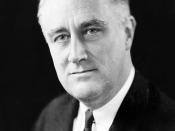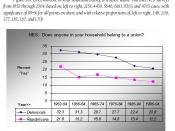Political Parties
The Republican Party was born in 1854 as a party of protest against the extension of slavery into the territories. A group of Whigs, Free-Soilers, and antislavery Democrats gathered in a church at Ripon, Wisconsin, to recommend the creation of a new party to fight the further expansion of slavery. The name "Republican Party" was suggested at the meeting. The political organization that resulted from the meeting replaced the Whigs as the rival party of the Democrats, but it was a new party and not merely the Whigs masquerading under another label. The first Republican presidential candidate was John C. Fremont was not elected to the White House. In 1860, The Republican Party nominated Abraham Lincoln and he was elected president. His election was a rare fusion of the man and the times. Lincoln preserved the Union; in the process, he ensured the future of the Republican Party.
By rejecting slavery, the Republicans had automatically become a sectional party, representing the North and West. For 25 years after 1860, the Republicans consolidated their strength and ruled America, becoming known as the Grand Ole Party, a term later shortened to GOP. In describing the Republican Party, Theodore H. White once wrote: "Two moods color its thinking. One is the old protestant-Puritan ethic of the small towns of America . . . The other is the philosophy of private enterprise, the sense that the individual, as man or corporation, can build swifter and better for common good than big government. From middle-class America the republicans get their votes; from the executive leadership and from the families of the great enterprises they get their funds."
Since 1032, in most presidential elections, the Democratic Party has, in spirit, been the party of Franklin D. Roosevelt. The vast social-welfare programs launched by...


